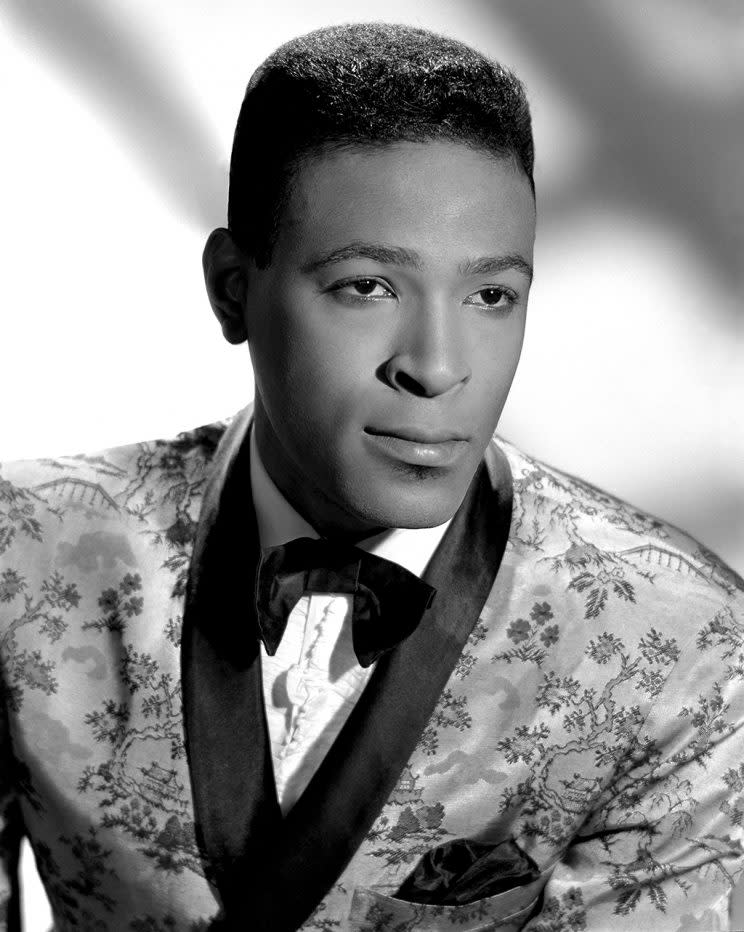When Marvin Gaye Was Shot and Killed by His Father

Marvin Gaye, wearing a fancy tux and blowing a kiss to the audience, stepped onto the stage at the 1983 Grammys to accept one of two awards he took home that night for his song “Sexual Healing.” The soul singer had been churning out hits since the ’60s, but he’d never taken home a Grammy. The audience gave him a standing ovation.
“I’ve waited a very long time — 20-something years to win an award such as this,” said the crooner, famous for such Motown classics such as “I Heard It Through the Grapevine,” “What’s Going On?” and “Let’s Get It On.”
The incident and the backstory
Gaye didn’t have long to enjoy his win. Less than 14 months later, on April 1, 1984, he was shot to death by his father, Marvin Gay Sr., one day before his 45th birthday.
Gaye — who added an “e” to his given name — grew up in Washington, D.C., singing at his minister father’s Pentecostal church. In the 2003 Gaye biography, Divided Soul: The Life of Marvin Gaye, author David Ritz quotes the singer’s mother, Alberta, as saying that father and son always had a difficult relationship.
“My husband never wanted Marvin, and he never liked him,” Alberta Gay said. “He used to say he didn’t think he was really his child. I told him that was nonsense. He knew Marvin was his. But for some reason, he didn’t love Marvin, and what’s worse, he didn’t want me to love Marvin either. Marvin wasn’t very old before he understood that.”
Although his father didn’t approve, Gaye began a career in music and, after playing locally, teamed up with Motown’s legendary Berry Gordy. He played the drums for other artists and eventually released his own songs. He had his first top 10 hit on Billboard’s Hot 100 chart in 1963, with “Pride and Joy.” Hits including “How Sweet It Is to Be Love By You,” “Mercy Mercy Me (The Ecology),” and duets with Tammi Terrell, such as “Ain’t No Mountain High Enough,” made Gaye one of Motown’s biggest stars of the ’60s and ’70s.

But as the story often goes, trouble in Gaye’s personal life came along with fame. He struggled with drug addiction and canceled shows, and he had problems with finances and in his marriage to Berry Gordy’s sister, Anna Gordy, whom he married in 1963. He attempted suicide at least once.
In 1975 Anna filed for divorce, sparking a messy split that took two years to get resolved. Gaye quickly married Janis Hunter, but she also filed for divorce by 1982. Struggling financially, Gaye filed for bankruptcy before the IRS came after him for $2 million in back taxes. He toured Europe for a while, but returned stateside in the early ’80s to make a comeback, fueled by his 1982 song “Sexual Healing.”

Gaye’s death happened in an L.A. home he bought for his parents, after he had fallen back into drug use and, by some reports, paranoia. His parents had been arguing over an insurance document Saturday night, and when the subject came up again on Sunday morning, Gaye and his father “became involved in a verbal dispute that led to a physical altercation, pushing and shoving,” Los Angeles Police Department’s Lt. Bob Martin told the New York Times. The father retrieved a pistol from his room and then shot his son twice in the chest. The shooter waited outside for the police to arrest him, and the “Prince of Soul” was declared dead at the hospital within half an hour.

Gaye shocking death received major coverage in the media — including a front-page story in the New York Times and Dan Rather’s report on the CBS Evening News — at a time when celebrity and entertainment news was not covered nearly as much as it is in the TMZ era. Jet magazine reported that a star-studded crowd of 400, including Stevie Wonder and Smokey Robinson, attended Gaye’s public funeral in L.A. Diana Ross released a tribute song, “Missing You,” that became a hit.
After Gaye’s death, his mother, Alberta, filed for divorce, and she later founded the Marvin P. Gaye Jr. Memorial Foundation to help people overcome drug addiction. In 1987, she died of bone cancer in Burbank, Calif.
Gay, who was 69 when he shot his son, was convicted of voluntary manslaughter and sentenced to a six-year suspended prison term, claiming that he acted out of fear for his safety. He died of pneumonia in a Long Beach, Calif., retirement home in October 1998.
The legacy
In the years since Gaye’s death, Lenny Kravitz, Cameron Crowe and others have tried to produce a movie about him, but the family hasn’t cooperated and the project has never gotten off the ground. Jamie Foxx could change all that, because he’s set to produce and star in an upcoming series executive produced by one of the late star’s three children, Marvin Gaye III.
Gaye’s musical influence remains strong. Rolling Stone ranked him sixth on its 2010 list of the Greatest Artists of All Time. He was inducted into the Rock and Roll Hall of Fame in 1987, and his songs are in permanent rotation on oldies stations and elsewhere. The Gaye family successfully sued Robin Thicke and Pharrell Williams because of similarities between their 2015 smash hit “Blurred Lines” and Gaye’s 1977 “Got to Give It Up.”
Oh, and the Grammys? He did return there … in spirit. He was recognized with a Lifetime Achievement Award in 1996 — 12 years after his death.
Read more from Yahoo Celebrity:


